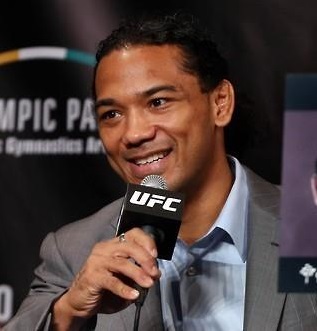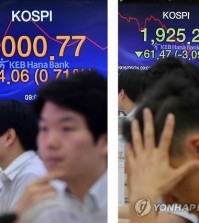- California Assembly OKs highest minimum wage in nation
- S. Korea unveils first graphic cigarette warnings
- US joins with South Korea, Japan in bid to deter North Korea
- LPGA golfer Chun In-gee finally back in action
- S. Korea won’t be top seed in final World Cup qualification round
- US men’s soccer misses 2nd straight Olympics
- US back on track in qualifying with 4-0 win over Guatemala
- High-intensity workout injuries spawn cottage industry
- CDC expands range of Zika mosquitoes into parts of Northeast
- Who knew? ‘The Walking Dead’ is helping families connect
Competing in mother’s native land “humbling” experience for UFC’s Ben Henderson

Ben Henderson, a UFC fighter born to a Korean American mother and an African-American father, speaks during a press conference in Seoul on Sept. 8, 2015. (Yonhap)
SEOUL (Yonhap) — For Ben Henderson, an Ultimate Fighting Championship (UFC) fighter born between a Korean American mother and an African American father, competing in his mother’s native land will be a “humbling” experience.
Henderson will take on Thiago Alves in the headliner at UFC Fight Night 79 in Seoul on Nov. 28, the first UFC competition in South Korea. Tickets for the event went on sale Tuesday, and the UFC marked the occasion with a press conference in Seoul attended by Henderson and other fighters.
After a brief press conference, Henderson said in a separate interview that he feels “lucky” just to be on the card for the South Korean event.
“I made a promise to Korean fans that if the UFC comes to Korea, I will do my best to make sure I am on the card, and hopefully in the main event,” he said. “It’s all coming to fruition. I am very excited.”
He said he will have dozens of relatives from his mother’s side of the family in attendance in November. Having fought in some big matches before massive crowds, the 31-year-old said he wasn’t nervous about the bout in Seoul.
It carries a different sort of significance for him.
“It’s very humbling to be coming to Korea and fight in my mother’s country,” he said. “Hopefully, I’ll be able to have a great fight for my family.”
Henderson has moved up from lightweight to welterweight, and defeated Brandon Thatch in his welterweight debut in February. Henderson, a former UFC lightweight champion, has never faced Alves, ranked 13th in welterweight.
“There are pros and cons to moving up the weight class,” Henderson said. “You lose strength, but you’re quicker, faster, more agile and more athletic than some of the bigger guys. Hopefully, the pros will outweigh the cons.”
He said beating Thatch gave him a confidence boost not simply because he won the fight but he did so in a convincing fashion.
“You can win a fight but still have a bad performance,” he noted. “Performance-wise, he didn’t feel too much stronger than me. Performance in that fight led to making a permanent move to 170 pounds (welterweight).”
He called Alves “very tough” and “very technical in how he fights.”
“He fought for the UFC belt before at 170 pounds,” Henderson said of Alves’ loss to Georges St-Pierre in 2009. “He’s a consummate professional. I expect him to come out and try to beat me up and hurt me. My job is to make sure he doesn’t do that. My strategy is to keep him on his toes and keep him guessing, and not let him know what I am going to throw.”
Over the next two months, Henderson said he will train much the same way he’s been training all along — doing strengthening and conditioning, and working with boxing, wrestling and jujitsu coaches, “and get beat up a whole lot by teammates.”
“I always expect to do very well and to be up there fighting for titles,” he said. “I think my chances for fighting for the title at 170 are just as good as fighting at 150 for the title. I am as confident as any other fighter in the UFC.”















